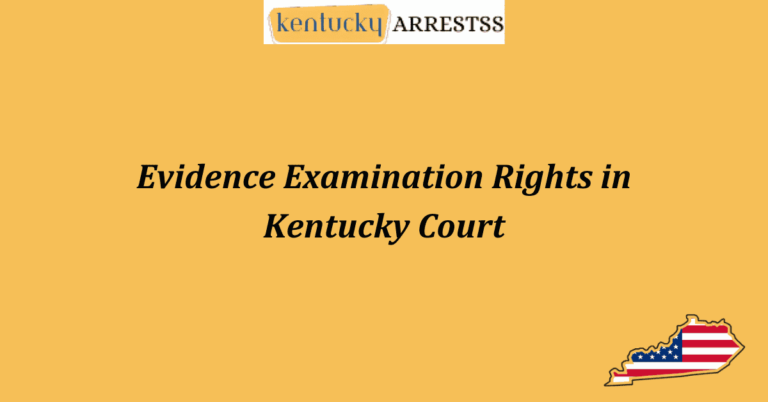Presumption of Innocence in Kentucky Legal System
In the Kentucky legal system, the concept of presumption of innocence plays a crucial role. This fundamental principle ensures that individuals are considered innocent until proven guilty beyond a reasonable doubt. It serves as a cornerstone of the justice system, emphasizing the importance of fair trials and due process. By upholding the presumption of innocence, Kentucky aims to protect the rights of the accused and maintain the integrity of the legal process.
Within the Kentucky legal system, the presumption of innocence is deeply rooted in the belief that every individual deserves a fair chance to defend themselves. This principle guides the actions of law enforcement, prosecutors, and judges, shaping the way criminal cases are investigated and tried. By understanding the significance of presumption of innocence in the Kentucky legal system, individuals can appreciate the importance of upholding this fundamental right in ensuring justice and fairness for all.
Importance of Presumption of Innocence
The presumption of innocence is a fundamental principle in the legal system that upholds individual rights and liberties. It ensures that individuals are considered innocent until proven guilty, shifting the burden of proof onto the prosecution. This principle is essential in safeguarding against wrongful convictions and ensuring that individuals are not unjustly punished.
Upholding Individual Rights and Liberties
The presumption of innocence plays a crucial role in protecting the rights and liberties of individuals. It reflects the idea that everyone is entitled to a fair trial and should not be treated as guilty until proven otherwise. This principle promotes trust in the legal system and ensures that individuals are not subject to arbitrary or baseless accusations.
Safeguard Against Wrongful Convictions
By placing the burden of proof on the prosecution, the presumption of innocence acts as a safeguard against wrongful convictions. It requires the state to present evidence that proves the guilt of the accused beyond a reasonable doubt. This helps prevent miscarriages of justice and ensures that only those truly guilty are convicted.
Fair Legal Process in Kentucky
In Kentucky, the presumption of innocence is a foundational principle that underpins the fair legal process. It ensures that individuals are treated as innocent until proven guilty and are entitled to a fair trial. This principle is enshrined in the state’s legal system to uphold justice and integrity.
Role of Evidence and Due Process
The presumption of innocence in Kentucky emphasizes the importance of evidence and due process in legal proceedings. It requires that the state provide sufficient evidence to establish guilt and ensures that individuals are afforded their rights to a fair and impartial trial. This principle protects against arbitrary or unjust decisions.
Ensuring Justice and Integrity
By upholding the presumption of innocence, Kentucky’s legal system ensures justice and integrity in the adjudication of criminal cases. This principle promotes transparency and accountability, ensuring that individuals are not unfairly targeted or convicted. It fosters public trust in the legal system and upholds the principles of democracy.
Foundation of Democratic Values
The presumption of innocence is a cornerstone of democratic values, promoting trust and accountability in the legal system. It underscores the importance of fairness and impartiality in legal proceedings, ensuring that all individuals are treated equally before the law. This principle is essential in maintaining the integrity of the legal system.
Promoting Trust and Accountability
By presuming innocence until proven guilty, Kentucky’s legal system promotes trust and accountability among all stakeholders. This principle ensures that individuals are not unjustly targeted or prosecuted, fostering confidence in the fairness of the legal process. It holds the state accountable for proving guilt beyond a reasonable doubt.
Ensuring Fairness in Legal System
The presumption of innocence in Kentucky is vital for ensuring fairness in the legal system. It prevents prejudice and bias from influencing legal decisions and protects individuals from being unfairly convicted. This principle reflects the democratic values of equality and justice, ensuring that all individuals are treated with dignity and respect.
Frequently Asked Questions
Our Frequently Asked Questions section aims to provide detailed information about the Presumption of Innocence in the Kentucky Legal System. Below, you will find comprehensive answers to common queries related to this topic.
What is the Presumption of Innocence?
The Presumption of Innocence is a fundamental principle in the legal system that states a person is considered innocent until proven guilty. This means that the burden of proof lies with the prosecution to establish guilt beyond a reasonable doubt.
How does the Presumption of Innocence protect individuals?
The Presumption of Innocence serves as a safeguard against wrongful convictions and ensures that individuals are not unjustly punished for crimes they did not commit. It places the onus on the prosecution to present sufficient evidence to convict a person.
Does the Presumption of Innocence apply to all legal proceedings?
Yes, the Presumption of Innocence is a universal principle that applies to all legal proceedings, including criminal, civil, and administrative cases. It is a cornerstone of the justice system and is enshrined in the Constitution.
Can the Presumption of Innocence be waived?
While the Presumption of Innocence is a fundamental right, individuals can choose to waive this right in certain circumstances, such as when entering into a plea agreement or agreeing to a bench trial. However, such decisions should be made voluntarily and with full understanding of the consequences.
What happens if the Presumption of Innocence is violated?
If the Presumption of Innocence is violated, it can lead to miscarriages of justice and wrongful convictions. It is essential for all parties involved in legal proceedings to uphold this principle to ensure a fair and just outcome.
How does the Presumption of Innocence impact the role of the jury?
The Presumption of Innocence guides the jury’s decision-making process by reminding them that the accused is innocent until proven guilty. Jurors must evaluate the evidence presented in court and determine whether the prosecution has met the burden of proof required to establish guilt.






